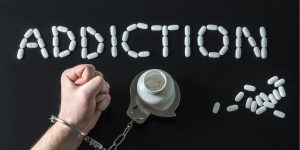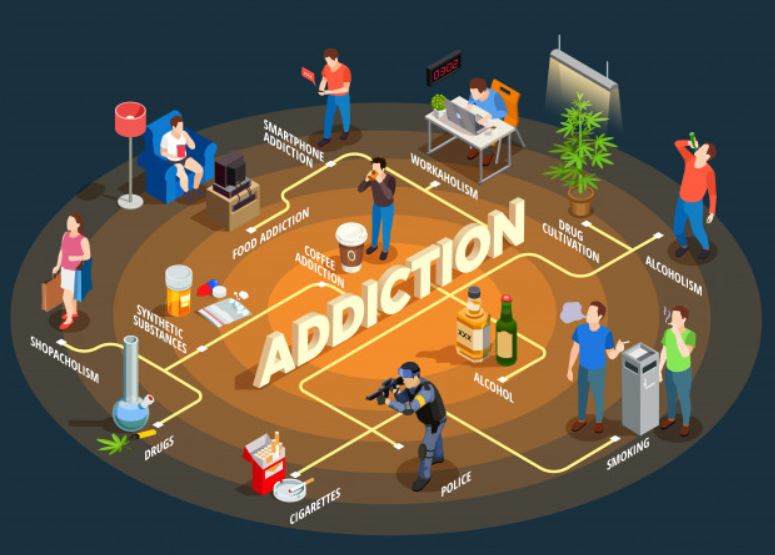Contents
- 1 What Is Addiction?
- 2 How Does It Start?
- 3 Signs Of Addiction
- 4 Types Of Addiction
- 5 Causes Of Addiction
- 6 Bad Side Of Addiction
- 7 Good Side Of Addiction
- 8 Talking With Someone About Addiction
- 9 Best Way To Treat Addiction
- 10 Cycle Of Addiction And Recovery
- 11 What Is Recovery?
- 12 Tips For Overcoming Addiction
- 13 Treatment For Addiction
- 14 Principles Of Addiction Treatment
- 15 Conclusion
- 16 A Word From Therapy Mantra
What Is Addiction?

Addiction is a condition that results when a person ingests a substance (e.g., alcohol, cocaine, nicotine) or engages in an activity (e.g., gambling, sex, shopping) that can be pleasurable but the continuation of which becomes compulsive and interferes with ordinary life activities such as work, relationships, or health. Addictions are characterized by cravings, which are a powerful desire to take a drug or engage in an activity despite negative consequences. The term addiction describes a chronic, relapsing disease that has biological, psychological, and social aspects. Biological aspects include tolerance to the drug or activity of choice and withdrawal symptoms. Psychological aspects include craving for an activity or substance despite the negative effects it may have on relationships with others.
How Does It Start?
Addiction is a complex disease and many factors play a role in its development. These include genetics, social environment, age, and availability of substances or activities that can become addictive. For example, while some people drink alcoholic beverages without any problems, others who try alcohol may develop an addiction even when the use is occasional or limited to social settings.
Addiction can start in different ways. Some people may start using drugs or alcohol because they are struggling with stress or depression. Others may start because they want to fit in with a group of friends or they enjoy the feeling of being high or drunk. Gambling addiction can start with someone just trying it out once and then became hooked on the rush of winning money. Sex addiction often starts with someone looking for sexual pleasure and then becomes compulsive.
Signs Of Addiction
 If you think you may have it, look for these signs:
If you think you may have it, look for these signs:
1) Behavioral changes (e.g., increased cravings, tolerance)
2) Physical symptoms (e.g., withdrawal, increased use)
3) Psychological issues (e.g., time spent obtaining the substance or activity, preoccupation with the substance or activity)
4) Interpersonal problems (e.g., arguments, fights)
Types Of Addiction
Addiction can be to drugs, alcohol, food, sex, or gambling. It can also be an to work or exercise. There are many different types of addiction, and each one has its own unique characteristics.
Causes Of Addiction
Addiction can be caused by many different things. Some people may start using drugs or alcohol because they are trying to self-medicate for a mental health problem such as anxiety or depression. Others may start with recreational use and then become addicted.
The exact cause of addiction is not known. Genetics may play a role, as it tends to run in families. The environment also is thought to contribute—that’s why many people who become addicted report that they began their habit after exposure to drugs or alcohol at parties or bars with friends.
Still, there are several theories about what causes it:
- Biological causes
- Psychological causes
- Social and environmental causes
- Moral and spiritual causes
Bad Side Of Addiction

Addiction causes changes in the brain that cause people to seek out drugs or other addictive activities even when they know doing so will harm themselves or others. Addiction also involves psychological issues, such as a craving for the substance or activity of choice.
Good Side Of Addiction
While addiction can have negative effects on work, relationships, and health, it also has positive effects socially because it provides people with a way to bond and interact with one another that is different from most other activities.
The US surgeon general has reported that approximately 21 million people in the United States suffer from some type of addiction and that about 10 percent (2 million) are addicted to illicit drugs such as cocaine or heroin. Alcoholism is the most common form of substance abuse, with nearly 17 million Americans addicted to alcohol, including 6.5 million who have both alcoholism and another mental illness.
Talking With Someone About Addiction
If you are concerned about your own addiction or someone else’s, keep in mind the following:
- Don’t be judgmental
- Create an accepting atmosphere that encourages dialogue
- Express empathy and concern
- Be gentle and encouraging. Remember, addiction is a chronic disease that may require repeated interventions before the person accepts treatment.
Best Way To Treat Addiction

Some people wonder whether addiction should be treated as a medical problem or whether it is a moral failing that needs to be corrected by the person with an addiction. The answer is that both types of treatment can work.
The traditional approach to treatment has focused on treating the addict’s drug or alcohol problem. This is because substance abuse appears to change brain function in people with addiction, making it difficult for them to stop using drugs without help. Effective treatment programs typically combine medical and psychological approaches.
Cycle Of Addiction And Recovery
Unlike the cycle of other diseases (e.g., diabetes), treatment typically involves periods of abstinence followed by periodic or continuous use. During treatment, the person with an addiction needs to avoid the substance or activity of choice. If abstinence is not achieved, the person may return to an earlier stage of recovery or addiction.
Addiction In The Workplace
Work-related addictions also can be a problem in some workplaces. They include compulsive gambling and the abuse of alcohol, prescription medications, and illegal drugs such as marijuana. Addictions related to work usually involve compulsive activities (e.g., compulsive gambling) or substances (e.g., alcohol, prescription medications) that can be taken legally at work.
What Is Recovery?
Recovery is the process of overcoming addiction. It is a way for people to rebuild their lives after addiction has taken over and harmed their relationships, family life, and career. Many forms of treatment exist that help people recover from people from it: some focus on the social and psychological aspects of addiction, while others address both the physical and mental aspects.
There are many forms of treatment available for people. Recovery can take many forms but is most effective when it involves all elements of addiction (the biological, psychological, and social aspects).
The Goal Of Recovery
Recovery from addiction involves abstinence from drugs or alcohol. However, just as people recover in different ways, they also may recover at different rates. Some people are able to stop using substances altogether without relapse, while others must abstain but still deal with cravings and the risk of relapse for a long time after treatment ends.
Addiction-Proof Your Life
If you are recovering from addiction or helping someone else recover, here are some guidelines to help you maintain your sobriety:
- Avoid people, places, and things that trigger cravings
- Take it one day at a time
- Follow the guidance of your treatment team
- Join a support group
If you have a substance use disorder, you should abstain from using alcohol and other drugs even when prescribed by your doctor for another medical condition.
Protecting Others From Addiction
If you are recovering from addiction, but still engage in some addictive behavior such as overeating or gambling, it may be necessary to restrict your freedom to protect others. This might mean that you do not go to certain places or associate with particular people, many of whom may trigger your addiction and cause cravings.
Tips For Overcoming Addiction

Addiction can be a difficult problem to overcome. However, there are many things that you can do to increase your chances of success. Here are some tips:
1) Take it one day at a time. Don’t try to overcome your addiction all at once. Instead, focus on one day at a time and take it one step at a time.
2) Follow the guidance of your treatment team. Addiction is a complex problem, and it is best treated with the help of a professional team. Make sure to follow the advice of your doctors and therapists.
3) Join a support group. There are many support groups available for people struggling with addiction. This can be a great way to get help and support from others who are in the same situation.
4) Avoid people, places, and things that trigger cravings. Cravings are a normal part of addiction recovery. However, they can be very intense and make it difficult to resist the urge to use drugs or alcohol again. If you have a substance use disorder, avoid going to places where you might run into your drug dealer, for example. Go to places where you know it is safe and there is no chance of temptation.
5) Take care of yourself. In order to stay sober, you need to take care of yourself physically, emotionally, and spiritually. Addiction can cause a lot of stress on your body and mind, which means that your overall health can suffer. Eat well, take time for relaxation, and find ways to manage stress.
Treatment For Addiction
Addiction is a chronic disease that requires treatment just like other diseases such as diabetes or heart disease. Treatment can take many forms but is most effective when it involves all elements of addiction (the biological, psychological, and social aspects).
There are many different types of therapy as a treatment. The most common ones are cognitive-behavioral therapy, motivational enhancement therapy, and 12-step facilitation therapy.
Cognitive-Behavioral Therapy

Cognitive-behavioral therapy (CBT) is a type of psychotherapy that is used to help people change their thoughts and behaviors. CBT is based on the idea that our thoughts cause our feelings and behaviors. If we can change our thoughts, we can change our feelings and behaviors. CBT focuses on helping people become aware of their thoughts and how they are affecting their behavior. It also helps people learn new ways to think about things and react to situations in a healthier way.
Motivational Enhancement Therapy
Motivational enhancement therapy (MET) is a short-term motivational treatment for addiction. The therapist uses MET to first increase the motivation of people who are ambivalent about their behavior change. People with low motivation are taught how to develop skills that will help them through difficult times when cravings may be high. This therapy also helps people make lifestyle changes by looking at their lifestyles and thinking about how they can change things that are not helpful.
12-Step Facilitation Therapy
This therapy is based on the 12 steps of Alcoholics Anonymous (AA) and other 12-step groups. It helps people become active in their recovery by encouraging them to attend meetings where they meet with others who have similar addictions. People who have been through this therapy describe it as supportive and helpful to their recovery.
Principles Of Addiction Treatment
There are many different principles of addiction treatment that can be effective in helping people recover from addiction. Some of the most important principles include:
- Abstinence from drugs and alcohol is necessary for recovery.
- Recovery takes place in many different ways and at different rates for different people.
- Treatment should address all elements of addiction (the biological, psychological, and social aspects).
- Taking it one day at a time is important for overcoming addiction.
- Support from other people is essential for recovery.
- It is necessary to avoid people, places, and things that trigger cravings.
- Taking care of yourself is essential for staying sober.
- Recovery is a process that takes place over time, not something that happens quickly.
Conclusion
It is a very unfortunate truth of our society that people have many different addictions. Whether it’s to drugs, alcohol, sex, or cigarettes, it can be difficult for the person suffering from addiction and their loved ones. So what are you supposed to do if someone in your life has it? It may seem impossible at first glance but there are some things you can try to help them get on track with getting sober. The important thing is that you don’t give up on them- even when they feel like giving up themselves! You need to stay by their side and provide encouragement and love no matter how long it takes because sobriety isn’t something anyone achieves overnight without the effort put in every day.
A Word From Therapy Mantra
Your mental health — Your psychological, emotional, and social well-being — has an impact on every aspect of your life. Positive mental health essentially allows you to effectively deal with life’s everyday challenges.
At TherapyMantra, we have a team of therapists who provide affordable online therapy to assist you with issues such as depression, anxiety, stress, workplace Issues, addiction, relationship, OCD, LGBTQ, and PTSD. You can book a free therapy or download our free Android or iOS app.


